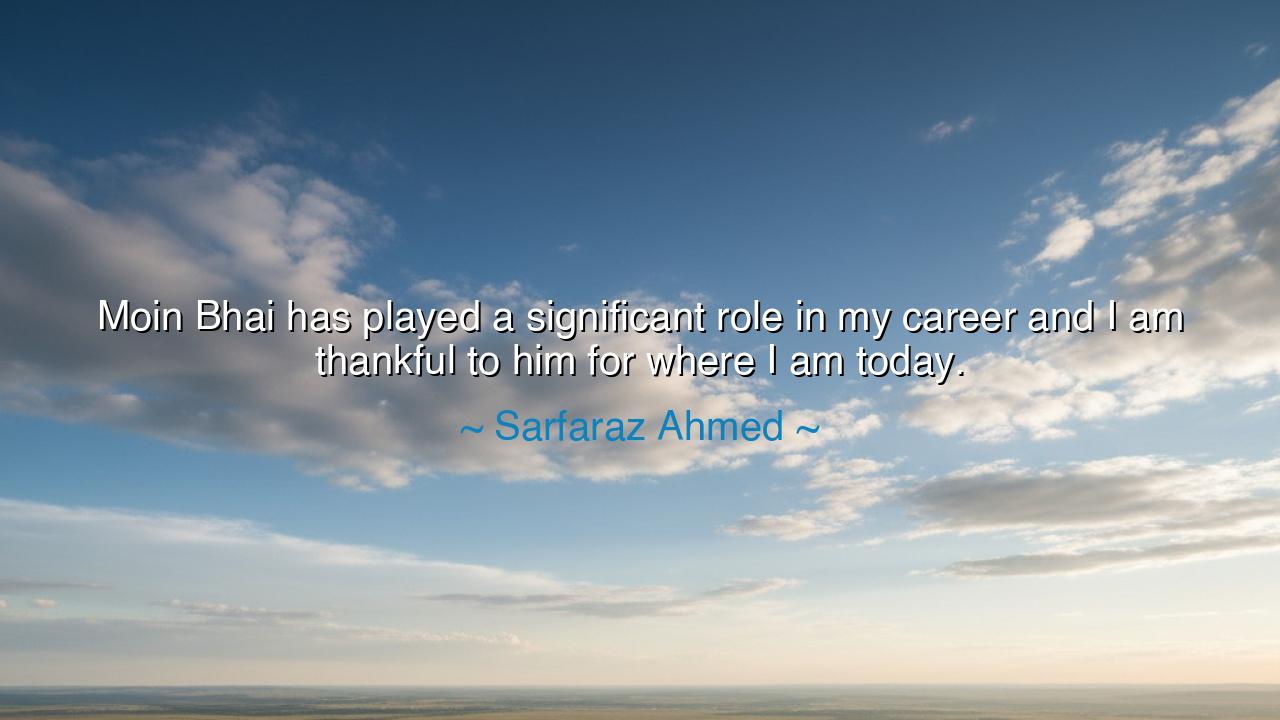
Moin Bhai has played a significant role in my career and I am
Moin Bhai has played a significant role in my career and I am thankful to him for where I am today.






Hear the voice of Sarfaraz Ahmed, a son of cricket and a bearer of humility, who declared: “Moin Bhai has played a significant role in my career and I am thankful to him for where I am today.” In these words we hear not only gratitude but the timeless truth that no man ascends the mountain of greatness alone. Behind every champion stands a mentor, a guide, a brother who lifts him when he stumbles and points him toward the path when the way seems uncertain. To be thankful is to honor that sacred bond and to ensure that the name of the helper is remembered alongside the name of the hero.
The ancients always revered the role of the mentor. In Greece, the very word “mentor” comes from Mentor, the wise friend of Odysseus, who guided young Telemachus in his father’s absence. In India’s guru-shishya tradition, the guru was exalted as the one who leads the disciple from darkness to light. By calling Moin Bhai significant, Sarfaraz acknowledges that his achievements are not his alone, but are rooted in the guidance, wisdom, and faith of another. This humility reflects not weakness, but strength, for the greatest of men are those who remember those who helped them rise.
Consider the story of Chanakya and Chandragupta Maurya. Chandragupta became a mighty emperor, uniting lands and forging an empire, yet his greatness was inseparable from the wisdom and vision of his teacher, Chanakya. Without Chanakya’s guidance, his destiny may have withered; with it, he changed history. So too with Sarfaraz: his journey as a cricketer, his rise to captaincy, his triumphs and trials, are tied to the counsel and support of Moin Bhai, whose influence shaped his path.
There is deep humility in Sarfaraz’s reflection. Many who achieve greatness forget their roots, speaking only of their own labor. But gratitude is the crown of the noble. By saying “I am thankful to him for where I am today”, he ties his destiny to another’s kindness, refusing to hoard glory but spreading it outward. This is the essence of honor: to lift the names of others so that they, too, are remembered in the song of history.
His words also remind us of the invisible networks of support that sustain every human endeavor. For behind every athlete, there is a coach; behind every leader, a teacher; behind every artist, a patron. The world often celebrates the visible hero but forgets the hands that nurtured him. Sarfaraz, in his thankfulness, corrects this imbalance, reminding us that greatness is communal, and that to honor those who helped us is to keep alive the chain of human solidarity.
The lesson for us all is eternal: be thankful for the ones who stood beside you in your struggle, for the ones who believed when others doubted. Speak their names, honor their efforts, and never forget the bridges that carried you across rivers of hardship. For gratitude keeps pride from consuming the soul and binds you to the truth that life is not conquered alone.
Practical wisdom follows: reflect on your own journey, and ask—who were the Moin Bhais in your life? A parent, a teacher, a friend, a mentor? Speak your gratitude aloud; let them know their influence mattered. And when the time comes, be a Moin Bhai to others: guide them, support them, and take joy not in your own glory but in the rise of another.
Thus, Sarfaraz Ahmed’s words rise beyond cricket into the realm of eternal wisdom: “Moin Bhai has played a significant role in my career and I am thankful to him for where I am today.” This is not only a son’s tribute to his mentor, but a teaching for all who walk the path of ambition. Honor your guides, be grateful to your helpers, and in turn, become a guide for others—so that the chain of gratitude and greatness is never broken.






AAdministratorAdministrator
Welcome, honored guests. Please leave a comment, we will respond soon